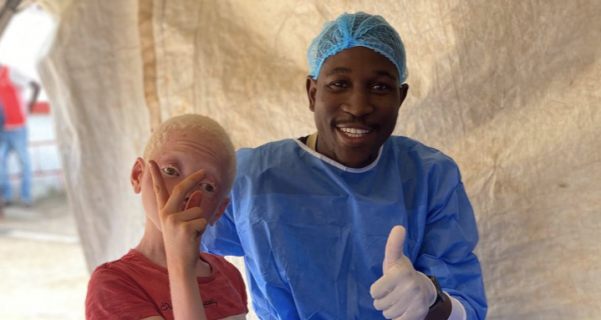More than a hundred children and adults from the municipality of Andulo, Bié province, benefited from consultations, and 12 cases of skin cancer were diagnosed, the main pathology affecting these citizens, according to specialist doctor Regiane Silva.
The Brazilian general practitioner has been working with albino people for 20 years and was part of a team of volunteer doctors who went to Andulo to care for the largest albino community in Bié, estimated at 320 people, as part of a solidarity initiative promoted by the organization Volta à África.
Albinism, a genetic condition that impacts the production of melanin (the pigment responsible for the color of skin, hair and eyes), affects approximately one in every 5,000 people in the world, according to the World Health Organization.
In Angola, the Government approved, in 2023, a Support and Protection Plan for People with Albinism, but the approximately 7,000 Angolan albinos continue to face challenges related to health and social inclusion.
The group of general practitioners, dentists, physiotherapists and pharmacists left Luanda for Andulo last Saturday, on a long and tiring 15-hour journey, carrying with them medicines and “a gesture of affection” for these people, Victor Moniz, the president of Volta à África, told Lusa.
Long-sleeved clothing items, caps, oral hygiene products and souvenirs for children, such as toys and cookies, were some of the goods distributed.
Regiane Silva said she felt “a little happier” than when the project began in 2022, as people looked better than the first time, when many looked “completely deteriorated.”
“Not that among the hundred or so that we treated there weren’t [people with a deteriorated appearance], but seeing children, in particular, being much better treated is a comfort to the heart, parents have understood the message of the importance of protecting these children with a hat, with Vaseline on their skin”, the doctor told Lusa, hoping “that this can continue”.
There are plans to hold another consultation this year to assess progress and whether the treatment has had an effect, said Regiane Silva. For the specialist, informing and educating families helps to improve the health of these people, who begin to compare “before, during and after”.
“Sometimes, they are worried about having a sunscreen, factor 50, which costs a lot of money and, therefore, they cannot treat themselves, but with a small pot of Vaseline, which costs 200 kwanzas, you can apply it to your body, your face [and protect your skin]”, he highlighted.
Regiane Silva was particularly concerned about the 12 diagnosed cases of skin cancer that will be transferred with the support of the local government to the Luanda Oncology Hospital, to continue treatment.
In addition to skin cancer, there is also a need for ophthalmologists and prescription glasses, and awareness in schools to seat children further forward to achieve better vision, the specialist described.
The doctor began treating people with albinism in Nigeria, a country where “albinos are killed”, while in Angola the biggest challenge is to demystify albinism as a difference in color.
“Whether I am blacker or the other is a little whiter, [they are still] normal people, there is no witchcraft, they are not wizards, they are nothing. They are normal human beings, with better or equal capabilities than mine, they just need opportunities and people who support them with treatment,” he stressed.
Abel Barros, 25, has two other albino brothers and was grateful for the act of solidarity, saying that his “color” has been a huge challenge, because there are people who think he is “different from them”, citing skin and eye problems.
“Some people think we are different from them, so they say we can’t be around them. As soon as they get close to us, they spit on our belly buttons, they think that if we get close they will be contaminated by our color, that is, that they will be like us,” he explained.
Having completed high school and without a steady job, the dream of a degree was postponed due to vision difficulties, said Abel Barros, asking the Government to pay more attention to the situation of albinos.
Josefina Domingos is the mother of four children, including Berenice Lena, an albino, 12 years old, who attends public school and has never suffered any type of discrimination.
“Since she was born she has been well received, people love her a lot and so do her classmates at school, this [discrimination] has never happened”, assured Josefina Domingos, admitting that “in the beginning it was difficult”, having been guided in caring for the child by a doctor with an equally albino daughter.







